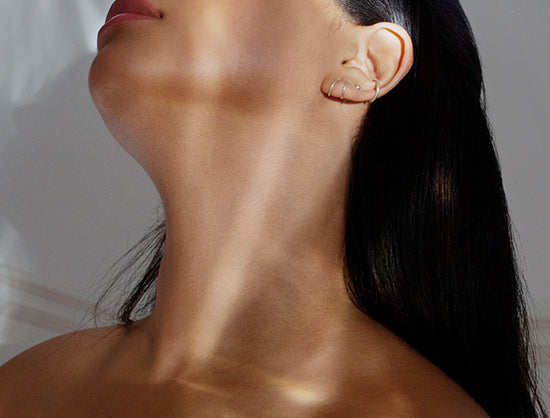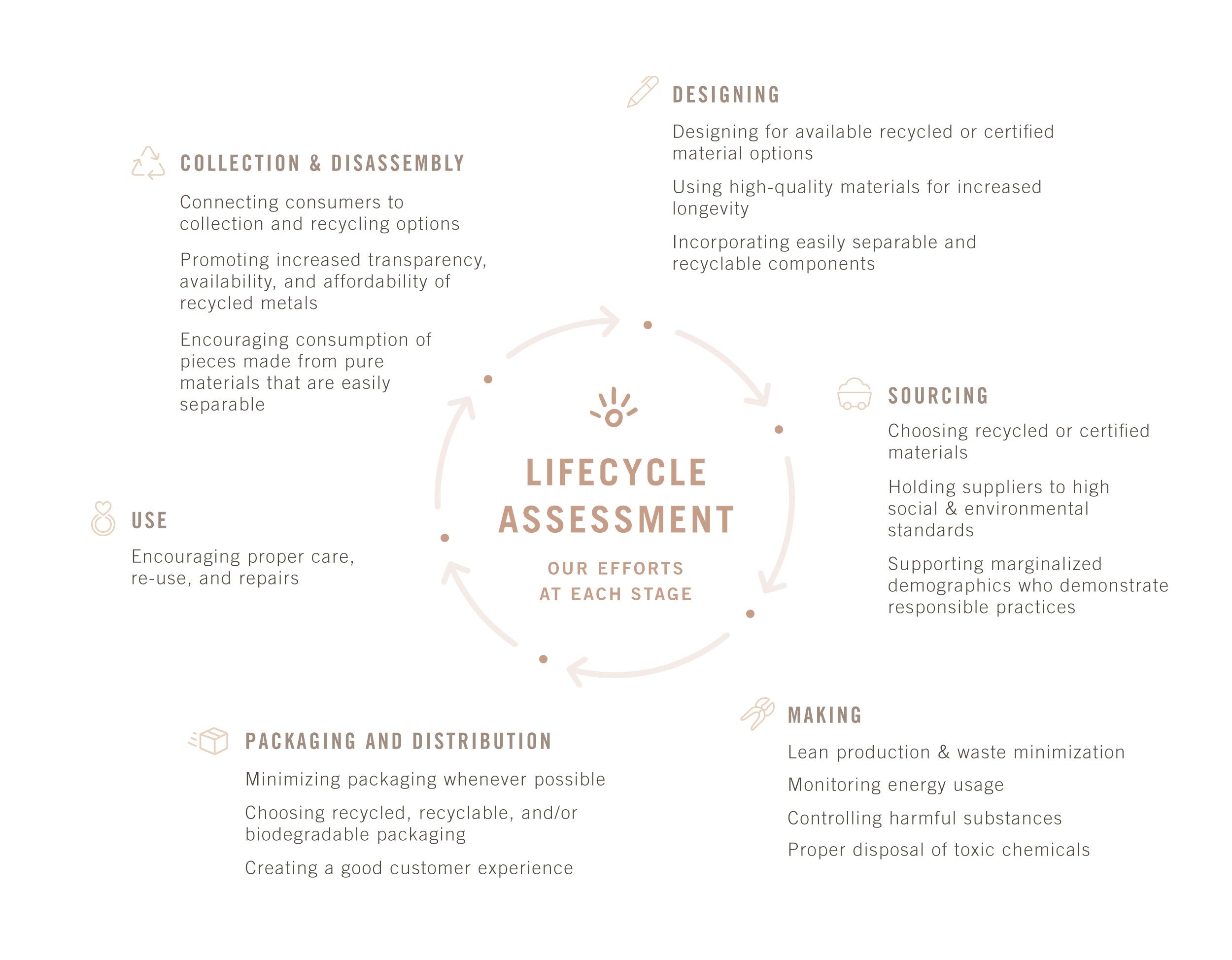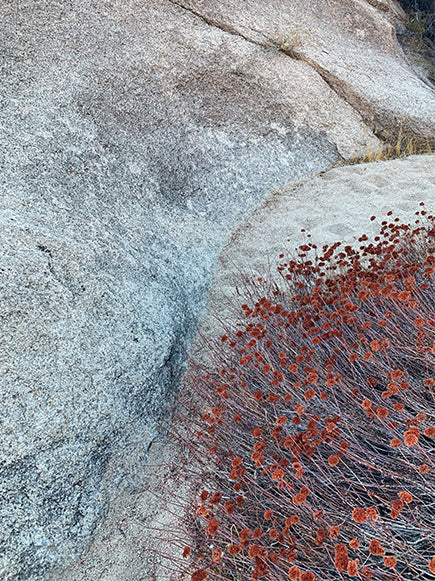Our Mission
We think of jewelry as an intimate adornment - a personal art piece worn close to the body. Similarly, our relationship with the natural environment is certainly a physical and perpetual one. Many Hands creates high-quality pieces that strengthen this intricate interconnection by honoring the environment, the production process, and the wearer.
Quick Links
02 Core Values
04 At A Glance
05 Process

VISION
Many Hands is founded in the belief that business can be a force for good. We envision a world where beautiful, responsibly produced jewelry effectively unites us across the globe.
MISSION
The goal is for Many Hands to help push the jewelry industry towards collective positive change by modeling responsible business practices, communicating transparently, and harnessing the power of collaboration and consumer pressure. We pour this passion into each piece of handmade jewelry to achieve a deeper connection with the wearer, with nature, and with each other.

Core Values
Transparency
Basically what this means is honesty and openness. We will always let you know if we’re using materials that for some reason don’t meet our own sustainability standards, helping you make an informed decision while shedding light on an area where we’re struggling to get it right. Being more transparent builds trust with our customers and helps spread knowledge to scale impact.
Collaboration
At Many Hands, we strongly believe that collaboration and sharing information is key to pushing the industry towards more ethical and regenerative practices. By sharing individual problems, solutions, and expectations, we (companies and consumers) can raise awareness to find better solutions more quickly.
Innovation
The jewelry industry is highly traditional and seems generally resistant to change in processes. But mounting evidence shows a desperate need for a shift away from destructive practices associated with the jewelry supply chain. We believe that innovation is undoubtedly key to achieving sustainable jewelry production at scale.
Inclusion
Many Hands stands for the rights of every person as detailed in the Universal Declaration of Human Rights, and we denounce racism and structural inequality. In recognition that social justice is inherently tied to responsible sourcing, our processes aim to uplift marginalized communities who face disproportionate barriers to wealth, health, and safety. None of us are free until all of us are free.
Balance & Respect
When discussing things like sustainability and human rights, things can quickly begin to feel a bit ‘extreme’. We like to take a more balanced approach to tricky issues, understanding that there are always nuanced, conflicting, and obscured perspectives. Real progress can be made through respectful discussion and sometimes even disagreement.

Issues In The Industry
Almost all of the raw materials that make jewelry come from the ground, usually located in under-developed or developing countries. Extracting these metals takes a huge toll on the natural environment by destroying viable land and leaving trails of toxic chemicals. Mine workers can be harmed in the process, and local communities are left displaced or dealing with hazardous waste. Not to mention tons of other factors like water and energy use, carbon emissions, and armed conflicts.
It’s a mess. The jewelry industry can do better.
Facing these challenges isn’t easy and we’ll never claim to be perfect - but we do promise to always be transparent.
Take a look below at how Many Hands navigates towards more regenerative practices within our own operations.
At A Glance
Some key steps we take to make our jewelry better
 Responsible Sourcing We choose metals and materials that are 100% recycled or certified from responsible artisanal small-scale miners |
 Handmade in the USA We use a lean production model to avoid overproduction and minimize waste, water, and energy consumption |
 Communication and Education We speak openly about our challenges and inform consumers about important industry issues |
 Collaborative Action and Research We work with industry stakeholders to promote research, innovation, and improved standards in the jewelry and mining business |
 Supply Chain Mapping and Inclusion We explore our supply chain and strengthen connections with upstream participants |
Process
Since extracting mineral components from the earth is inherently unsustainable, the jewelry industry must do its best to minimize its own negative impact. There is no one right way to do this, and everybody’s approach is different. At this stage in our small business, Many Hands uses a lifecycle assessment to monitor our footprint and identify areas for improvement.

From designing to sourcing, production, and distribution, all company operations are designed to save natural resources. Even before sourcing begins, we integrate the principles of circularity into the design process. Designing for circularity means considering the full lifecycle of our jewelry - making durable and repairable pieces, and ensuring that precious metals can be recycled into an input material for the production of a different product.
Our jewelry is handmade using responsibly sourced materials and minimal natural resources compared to large-scale operations. We think that these efforts create more special pieces, helping to nourish our bond with ourselves, with nature, and with each other. We are excited to see how our processes and perspectives evolve as we learn and grow.
Circularity is a term that all businesses and consumers should know and love. It is a key concept embedded within the United Nations Sustainable Development Goals.
Want even more details about the lifecycle of a Many Hands piece?
→ Our Approach to Making Jewelry More Sustainably: A Step By Step Breakdown

Partners & Commitments
We can’t accomplish our mission alone. These initiatives are helping us make beautiful jewelry we can all feel better about.
Ethical Metalsmiths
The Community for Responsible Jewelry
ABOUT
Founded in 2004, Ethical Metalsmiths is a community of caring buyers, jewelers, designers, and suppliers committed to responsible, environmentally-sound practices for all facets of the Jewelry Industry. They strive to connect and educate people globally from mine to market.
OUR ROLE
As of March 2021 we are proud members of Ethical Metalsmiths, as part of their Emerging Jewelers Program. Ethical Metalsmiths is a super thoughtful community of like-minded people who are taking steps to propel positive change in the jewelry industry. Their platform is a great way for us to participate in important discussions and stay updated on industry news and best practices.
Amazon Aid Foundation
Civil Society and Industry Stand in Solidarity to Create Awareness, Action and Reform.
ABOUT
Convened by Amazon Aid Foundation, the Cleaner Gold Network is an initiative to stand in alliance with organizations, companies, indigenous communities, scientists, artists and global citizens to publicly pledge to protect the Amazon and its peoples, promote a cleaner supply chain for gold, and demand the removal of all illegal miners from protected indigenous territories.
OUR ROLE
Many Hands has taken the Cleaner Gold Campaign Pledge and joined the Cleaner Gold Network as part of the Founding Circle. Meeting with the Cleaner Gold Network through their online sessions gives us incredibly direct access to industry participants - from mills to miners to indigenous community representatives. Anyone can take the pledge now and join us in protecting the Amazon from illicit and unregulated gold-mining.
WORK+SHELTER
Production partners empowering women in India
ABOUT
WORK+SHELTER is an ethical sourcing and “cut + sew” business that employs and empowers women in India that have demonstrated economic need. Their mission is to make it easy for organizations to purchase wholesale quantities of high quality, ethically made, customized sewn goods. The women of W+S are trained in production skills and paid fair wages, gaining the opportunity for upward mobility through job promotions and other programs like regular health and dental checkups.
OUR ROLE
When you order from Many Hands, you’ll receive your pieces in a small cloth jewelry bag made from upcycled sari silk by the women at WORK+SHELTER. This packaging decision helps us amplify our social impact by extending business and visibility to disadvantaged communities who typically lack access to the global market. Also, the bags are extra beautiful and unique compared to mass-produced alternatives.
To learn more about how empowering women helps build stronger communities, check out our Blog:
The Jewelry Glossary Project
ABOUT
In order to have meaningful conversations about responsible jewelry practices, we need to share an understanding of key terms. The Jewelry Glossary Project created a working group to collectively define 10 key terms that are commonly used (and misused) when discussing “sustainable” jewelry.
OUR ROLE
We are committed to precise language in accordance with The Jewelry Glossary Project definitions. We support the work of the Jewelry Glossary Project, and we consider their initiative to be an exemplary step towards sustainability across all industries.
To learn more about why words matter, head to our Blog:
Fair Luxury
ABOUT
Fair Luxury is an independent UK-based collective of jewellery industry changemakers with a shared vision for a responsible and sustainable future for people and planet.
OUR ROLE
Many Hands has taken the Fair Luxury Pledge, promising to conserve the environment, work transparently, take accountability, and educate and empower others. Other jewelers can take the pledge now and help make their business a force for good.
Last but definitely not least, we have to highlight our suppliers who do great work to get us responsibly made high-quality materials. It’s uncommon for jewelers to share information about their suppliers, but we like to hype ours up.

Other Resources
There are definitely a lot of challenges facing the jewelry and mining industry, but there are also many organizations doing great work to face them. We want to make it easier to get a quick look at the key players and initiatives that are making a positive impact in sustainable jewelry.
In addition to our partners listed above, we draw information and inspiration from these important resources below:
Alliance for Responsible Mining (ARM) is an NGO launched in 2004 by a network of independent organizations with the aim of promoting responsible standards and criteria for artisanal and small-scale mining. ARM developed the Fairmined program, which supports responsible practices in artisanal and small-scale mining, and generates a positive impact for global mining communities. When in doubt, it’s safe to look for brands offering Fairmined certified metals.
Fairmined is an assurance label created by ARM that certifies gold from artisanal small-scale mining operations who meet world leading standards for responsible practices. Unlike recycled metals, the Fairmined program contributes to the social and environmental development of global mining communities in Latin America and Asia by supporting things like fair wages, safe working conditions, and mercury-free techniques. Fairmined represents the power of purchasing for positive impact.
Formed in 2006, the Initiative for Responsible Mining Assurance (IRMA) is a multi-sector effort offering independent verification of all mined materials from industrial mines, and certifying compliance at the site of the mine. IRMA differs from ARM in that they work with larger-scale mines instead of artisanal small mines; members include the likes of Tiffany, BMW, and Microsoft. Given the pattern of industrial mines invading artisanal mining areas, IRMA and ARM have a historically strained relationship, but they have recently agreed on new standards for collaboration.
The Responsible Jewellery Council (RJC) is a group formed in 2005 by 14 industry members, including companies like De Beers diamonds and large trade groups like Jewelers of America. Applicants to the RJC must demonstrate (and maintain) their compliance with the RJC Code of Practices (COP) to become certified members of the RJC. Some organizations, including Human Rights Watch, have critiqued the RJC for weak standards and lack of representative governance; The RJC responds by continually improving their codes and practices.
SCS Global Services is a global leader in independent certification across many industries including food, textiles, and buildings. Within the jewelry industry, SCS offers third-party certification services for programs like Fairmined and the RJC. They also offer Certified Responsible Source verification (logo above) for refiners, manufacturers, and jewelers who source ethically and have minimal environmental impact. Many Hands sources all metals from SCS Certified Responsible suppliers unless directly stated otherwise.
The Chicago Responsible Jewelry Conference (CRJC) began in 2017 with the goal of assembling the world community (miners, makers, professionals, educators, and students) to learn, create relationships, and become active participants in change. The CRJC now operates a non-profit, the Responsible Jewelry Transformative, to implement more direct education through programs and symposia. CRJC conference sessions, annual reports, and other helpful resources are available online.
Christina T. Miller is a veteran in the sustainable jewelry space, and she offers her services to help jewelry businesses implement more responsible processes and practices. Her monthly Living Room Sessions are a great virtual hangout for community and conversation on sustainable jewelry. These donation-based sessions are available to anyone, and they create space for engagement among actors in the jewelry industry who don’t typically enjoy direct communication. We always try to tune in if we can.
At the heart of the United Nations 2030 Agenda for Sustainable Development are the 17 Sustainable Development Goals (SDGs), each serving as an urgent call to action to achieve peace and prosperity for people and the planet. Businesses (and consumers) can all review their sustainability strategies through the lens of the 17 SDGs, and assess which goals are most relevant to their operations. Many Hands is currently most focused on the following SDGs: 3, 5, 12, 13, 16, and 17.
Looking Ahead
As we continue to grow, we’ll be working on these goals for Many Hands

- Expanding our product offering, including offering more designs and integrating certified gold from responsible artisanal small-scale miners (ASM).
- Continuing our search for recycled and responsibly mined metals among more diverse material categories like chain and findings, and pushing mills to broaden their offerings through collective action.
- Understanding how to better monitor our water and energy use, as a step towards further minimizing and/or offsetting resource consumption.
- Creating greater social impact by collaborating on projects with artisans or other marginalized groups who may lack access to the global economy.
- Introducing additional fundraising and/or donation opportunities to help support worthy causes.
- Learning more about the key considerations surrounding sustainable jewelry production, and connecting more with existing organizations who help push the industry forward through certification, benchmarking, and sharing information.
- Implementing a more formalized benchmarking/tracking system for these goals, for improved reporting and accountability.
Behind The Brand
Born in Brooklyn and currently located in Los Angeles, Many Hands is a bi-coastal operation. Designer Samantha Wood manufactures every piece with care so that every wearer can feel some extra love embedded in their jewelry.
Want to know more about us?

Please don’t hesitate to reach out with questions or comments - we would love to hear from you! Drop us a line via email at hello@manyhandsjewelry.com, DM on Instagram @many___hands, or follow us on Pinterest.
